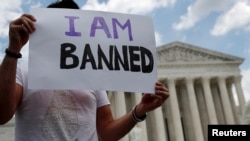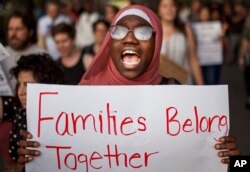A group of 36 people have filed the first legal challenge to the Trump administration's travel ban after the U.S. Supreme Court upheld it in June.
Muslim Advocates, Lotfi Legal LLC, the Immigrant Advocacy & Litigation Center PLLC, and Public Counsel have filed a class action lawsuit on behalf of some who had visa applications "wrongfully denied" or "stalled" by the administration.
The president's proclamation, which was upheld by the nation's highest court in June, allows for exemptions from the travel restrictions it imposes.
These waivers are granted on a case-by-case basis in instances where people can prove that the restrictions would cause an undue hardship, that they are not a threat to national security and that their coming to the U.S. would be in the country's interest.
But the plaintiffs write in their brief that few waivers are being granted and, therefore, the offer of waivers is fraudulent.
They are asking a U.S. district court to order the administration to stop its unlawful practice, rescind its previous visa denials, review each application on a case-by-case basis and provide precise guidelines on who is eligible for a waiver.
The lawsuit was filed in the Northern District of California under the name Emami v. Nielsen. It names Homeland Security Secretary Kirstjen Nielsen, Secretary of State Mike Pompeo and representatives of other government agencies as defendants.
One of the plaintiffs is Sudi, a U.S. and Somalia citizen, who married in 2016. She went to South Africa to meet her soon-to-be husband. The wedding took place in South Africa, and Sudi became pregnant. She returned to the U.S., then petitioned for a family-based immigrant visa for her husband in October 2016.
"The petition got approved around March, and I was really excited he would be here maybe by the time I gave birth," she told reporters during a conference call Monday.
That didn't happen.
Somalia is one of five Muslim countries, along with Iran, Syria, Libya and Yemen, that are under the travel ban's restrictions.
Sudi had a son May 26, 2017.
"I gave birth all by myself in the hospital with my mom instead of my husband. I waited for a while, and I was hoping when the baby turned a couple of months, maybe he would be here. My son turned one, and on his first birthday, his father is still not here," she said.
Her last hope was the U.S. Supreme Court.
"But on June 26, when the Supreme Court [ruling] took place, I felt like I wasn't welcomed here. My husband was denied [a visa] because of his nationality and religion he practices. Now, I am so devastated. I don't know what to do. This ban is affecting my family," she said.
In front of the nine Supreme Court justices, U.S. Solicitor General Noel Francisco argued in June that if people met the criteria for a visa waiver, they would not be denied entry to the U.S. However, the groups said there has been no guidance issued, and the administration has been denying or stalling virtually all visa issuance and waiver grants.





